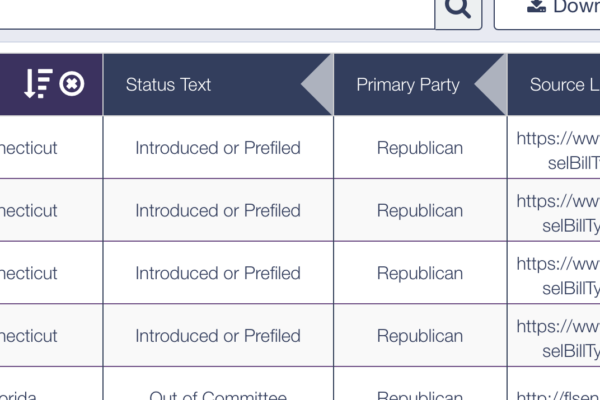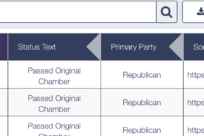Private school choice is emerging as a top education priority among state legislatures this session, with both Republicans and Democrats addressing the issue. While Republicans are largely seeking to expand the use of public funds to support private school tuition and other education expenses, Democrats are working to require more transparency and accountability in the programs or, in some cases, attempting to repeal them altogether.
FutureEd has identified at least 146 bills in 43 states that have been introduced or prefiled in 2023 that deal with private school choice. Nineteen have been enacted across 17 states—including Iowa’s H.F. 68, Arkansas’s S.B. 294, Florida’s H.B. 1 and Utah’s H.B. 215—many of which establish choice programs open to all students, regardless of income or disability status. The accounts allow families to spend state money not just on tuition but also on other approved expenses, such as tutoring, online courses and instructional materials.
A number of similar bills this session would create universal private school tuition programs, such as Oklahoma’s S.B. 822, which would establish the Education Freedom Account program, and Ohio’s H.B. 11, which would create the Backpack Scholarship Program. Other bills introduced this session are for targeted student populations or have eligibility requirements, such as Montana’s H.B. 393 for students with special needs or Missouri’s S.B. 255 for public school students whose family income is lower than 370 percent of the federal poverty line.
While proponents of past private school choice plans have framed them as vehicles for providing low-income and other students with alternatives to low-performing public schools, many backers of the new wave of legislation have touted the programs as a way to expand parents’ rights. Texas’s S.B. 176, for example, would establish a universal ESA to “empower parents of students in [the] state to direct the education of their children.”
Oklahoma’s S.B. 943 goes one step further and explicitly connects parent rights with culture wars rhetoric. It allows students to move from a “trigger district,” defined as any district that teaches about gender identity and sexual orientation, content sexual in nature, climate change ideology, social-emotional learning, animal rights activism, disparaging the Second Amendment, defunding the police, and Marxist ideology. Other triggers include books with obscene material and any employee or volunteer that engage in “anthropomorphic behavior.”
In addition to the bills that would establish new programs, lawmakers in several states are seeking to expand existing efforts. Missouri’s H.B. 242, for example, would allow any student, regardless of family income or student need, to participate in a program now reserved for students with disabilities or from lower-income families.
While Republicans are pushing ahead with expanding private school choice, Democrats in at least four states—Florida, Iowa, Montana, and Tennessee—have introduced a combined 10 bills that attempt to increase reporting requirements under the programs. In Florida, S.B. 1348 would require private schools that participate in a choice program to administer the state test to scholarship students, establish a curriculum that meets state standards, and submit annually scholarship students’ graduation rates and test scores, and the school’s budget. It would also require private schools to provide at least 20 consecutive minutes of recess each day in K-5.
Iowa’s S.F. 322 would require that applicants provide information on household income and size, race and ethnicity, disability status, and whether the student has an individualized education plan, which the state Department of Education would be required to report back to the legislature each year. S.F.412 would limit eligibility for the new universal ESA program to families who make less than 400 percent of the federal poverty line.
The Montana legislature is considering three bills: H.B. 533 would prohibit discrimination by private schools that receive tax-credit scholarships and H.B. 441 and 442 would require private schools that receive tax-credit scholarships to test students and make that information publicly available.
Tennessee lawmakers have introduced two companion bills—H.B. 1406 and S.B. 1139—that would require private schools that participate in school choice programs to “publish the school’s lesson plans and syllabus for each class offered by the school, a current list of materials in the school’s library collection, and the academic standards for each class offered by the school on the school’s website.” Two other bills—S.B. 1024 and H.B. 741—would repeal the Tennessee Education Savings Account Pilot Program, which was enacted in 2019 but held up for two years by court challenges, while other Republican-sponsored bills seek to expand it.
The interactive tracker, which includes all these bills and their status, will update as new legislation is introduced or advances through the state houses.



